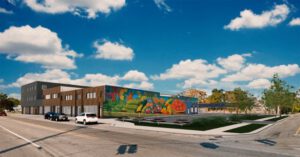Building Community Wealth Through Social Enterprises
By: Richard Murphy,
November 2, 2020
The division of “business” and “social service” is an unnecessary one, says a category of organizations that choose to marry the functions. Whether they come to it from a business perspective that recognizes the importance of the community fabric, or as a nonprofit looking for sustaining revenue streams, social enterprises take an intentional look at how to pursue both goals in tandem.
As part of our exploration of community wealth building at this year’s Convention, we heard from three organizations who’ve been building niches in this sector at the session Building Community Wealth Through Social Enterprises.

Since speaking at Convention, Evergreen has announced the acquisition/conversion of additional businesses to employee-ownership, including Phoenix Coffee, providing business owners an exit at pre-pandemic valuation.
Cleveland’s Evergreen Cooperatives have created a cluster of employee-owned businesses spanning from commercial laundry service to solar panel installation, seeking to root those businesses—and their profits—securely in the low-income neighborhoods they are part of. Whether through newly founded businesses or by transitioning existing businesses as their owners retire, Evergreen’s focus is on employee ownership. Having the business owned by the employees is the critical element of their program to build wealth in the community rather than extracting it from the community.

Lansing’s Allen Neighborhood Center has continually built on success to build both community and organizational capacity, working their way up from a food pantry to the Allen Place development.
Lansing’s Allen Neighborhood Center (ANC) grew out of a food pantry operating on a traditional charitable model to operate a year-round farmers market, food business incubator, and greenhouses, and has now moved into mixed-use real estate development. Each addition to their portfolio is selected to both serve neighborhood needs and also diversify the organization’s budget, allowing ANC to build resiliency internally and externally.
Peckham Inc., also based in Lansing, provides vocational rehab and job training for people with disabilities. The nonprofit operates business units ranging from call centers to cleaning services to supply chain to greenhouses—but all in the service of human development and supporting a “sense of belonging” for their client-employees. Beyond being a job training program, Peckham works to support their clients in advocating for their needs in the workplace.
The three speakers came to social enterprise from different sectors and motivations, but all three touched on themes of partnership, incremental growth, adapting to opportunities, and balance in their Convention session. Their roles can be complementary to that of local government within the community—bringing jobs and services to communities in ways that build individual and community wealth over time. They stressed that getting this model off the ground requires an “all hands on deck” approach with the active participation of business, local government, and anchor institutions, and urged that local leaders take a holistic view of how nonprofit social enterprise can support communities through both their economic and service functions, and watch for opportunities to partner with organizations in walking this path.
If you missed seeing this session live, you can watch it now on our Convention site. This and most of our other Convention 2020 sessions were recorded; you can use your existing registration to access them, or register now for on-demand access.